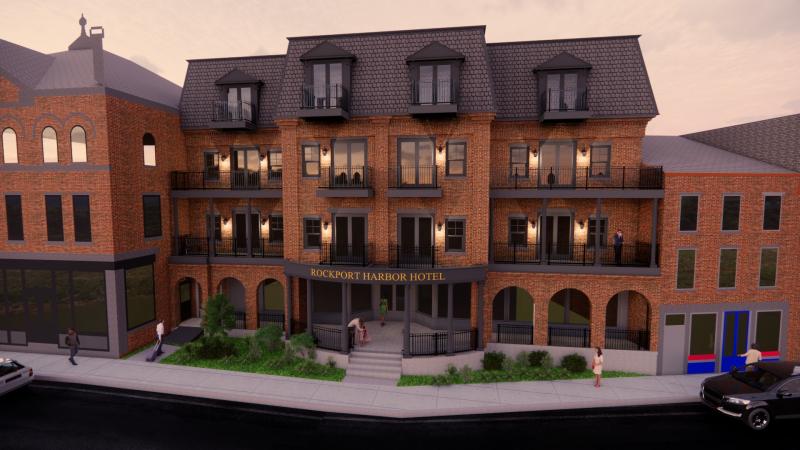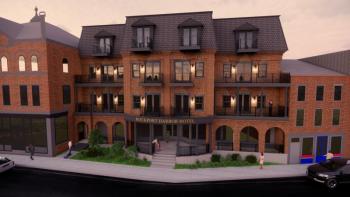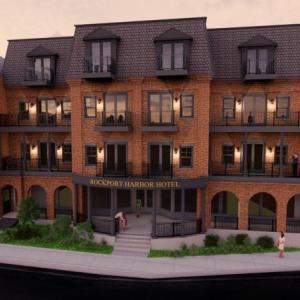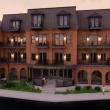Rockport Village hotel construction restraining order denied, but case not finished
ROCKPORT — Maine Superior Court Justice Bruce Mallonee has denied the request of the Friends of Rockport, John Priestley, Mark Schwarzmann and Clare Tully for a temporary restraining order of the 20 Central LLC construction of a new hotel in Rockport Village. But the issue, which concerns a town vote in favor of citizen petitions last August and state statute, is not dead, and the judge has directed the court clerk to schedule another date for oral arguments.
In a decision dated April 22 filed at the Knox County Superior Courthouse in Rockland, Mallonee explained his reasoning, drawing on much case law.
It is a complicated legal matter, and involves how the pandemic affected governmental processes, the scheduling of town meetings, and a state statute, all resulting in questions that Justice Mallonee referred as a constitutional hurdle.
At issue is a state statue, which imposed a hard deadline of 45 days for a vote to take place in response to citizen petitions whose language ultimately resulted in two warrant articles that appeared before Rockport voters at the 2020 annual town meeting. But the sequence of decisions, a Governor’s public health emergency order due to the pandemic, and the delay of town meeting, all created a legal tangle.
Justice Mallonee included in his decision a timeline that illustrated the course of events.
In February 2020, the Rockport Planning Board pre-approved a site plan application for the 26-room 20 Central Street hotel.
In early March 2020, the plaintiffs, who objected to the hotel as planned, circulated two citizen petitions proposing the town adopt new land use ordinance amendments that called for traffic studies, as well as limits on hotel rooms in the downtown zoning district.
The petitions included stipulations that made the amendments apply to off-site parking facilities that had not received final approval as of 45 days prior to the amendment’s enactment (which, in a normal, non pandemic year, would have been in early June).
The plaintiffs gathered enough signatures to place the land use ordinance amendments before the Select Board. They asked that the petition language be included on the June 9 Town Meeting municipal warrant. The Rockport Select Board subsequently placed them on the warrant.
On March 18, Gov. Janet Mills signed into law a public health emergency, which allowed municipalities to postpone their elections and referendums, including annual town meetings.
On March 23, the Rockport Select Board voted to postpone its town meeting and ballot votes.
On May 21, 2020, the Rockport Planning Board gave final approval of the hotel’s site plan.
That voted started the 45-day limit on a town vote, as outlined in state statute.
Five days later, the Select Board voted to reschedule the town meeting to August 18.
On July 5, the 45-day period following the Planning Board’s May 21 decision ended.
“Assuming 30-A M.R.S. 3007(6) applied, this was the last day the town could ‘nullify or amend’ the May 21, 2020 decision by voting in favor of the ordinance amendments described in Petitions A and B,” wrote Mallonee.
On Aug. 18, the petition amendments were both approved at the polls by Rockport voters.
On Aug. 19, “Counsel for 20 Central submitted a letter to the town arguing that the two potions could not be applied to the proposed hotel because, pursuant to [state statute 3007(6)] they had been passed more than 45 after the board’s May 21 approval decision,” wrote Mallonee.
On March 10, Rockport issued its building permit.
“The permit indicates that it is ‘subject to the Lane Use Ordinance Dated June 12, 2018 since this is the date that the Planning Board was going through their review,’” wrote Mallonee. “There was no condition requiring 20 Central to reduce the number of rooms to 20 or submit to the planning process for guest parking, as required by the amended ordinances passed by referendum in August 2020.”
From there, the plaintiffs appealed to the town’s Zoning Board of Appeals, as well as the court, including the request for motions to stay and restraining orders on the building permit.
In his decision discussion about the “Likelihood of Success on the Merits,” Mallonee noted that the critical state statute of a hard 45-day deadline: “neither refers to any exception nor leaves apparent room for one. This presents a constitutional hurdle the court must surmount in order to prove the relief Plaintiffs seek.”
He referenced multiple case law examples, discussing statutes of repose and statutes of limitations, and equitable tolling — all terms used in litigation.
Mallonee said, after researching and presenting other court actions made during the pandemic, that there is a common thread of courts having the authority to modify statutory deadlines in emergency situations if enforcement of the existing statutory deadlines would violate a constitutional right.
He said that this is the path that the plaintiffs are advancing, and characterized it as an uphill and steep climb.
“The court is not persuaded Plaintiffs’ argument is well enough developed at this preliminary state to permit their desired finding that they are likely to prevail on constitutional grounds,” he said.
But, he invited, “further briefing and development regarding the ‘likelihood of success on the merits’ prong.”
In inviting another round of oral arguments, he questioned:
“Is the 45-day deadline imposed by section 3007(6) unconstitutional as applied to the circumstances of this case?”
And:
“Did the issuance of the building permit on March 10, 2021 constitute a separate event under 3007(6) that generated a new 45-day deadline, thus requiring application of the two ordinances?”
Irreparable Harm
Justice Mallonee concluded that the plaintiffs would suffer more irreparable harm than the defendants with the hotel’s construction. At the same time, he weighed the ramifications.
He said the plaintiffs made a, “persuasive preliminary showing” that the hotel’s construction “will close off sight-lines for townspeople that have existed for decades.”
“In a scenic harbor side village in which both civic enjoyment and commercial success are predicated on scenic values, this could constitute a substantial loss,” he wrote. The potential loss is amplified by potential congestion or other complications resulting from traffic and parking that exceeds municipal capacity. None of this is literally ‘irreparable’; buildings can be “removed, reconfigured, and rebuilt. Parking lots and garages can be built.”
He continued:
“In the circumstances of this tiny village and this proposed hotel, for 20 Central to build the building only in order to deconstruct it would constitute waste of such magnitude that the court considers Plaintiff’s asserted loss to be irreparable,” Justice Mallonee wrote. “The same is true if parking as approved turns out to be unworkable; once the hotel is built, its guest will have to park their cars even if that means village space and systems are overburdened.”
But, in his conclusion, he said: “At oral argument, the court inquired of counsel what further evidence might be developed on the issue of irreparable harm. Responses varied. The court’s preceding summary suggests further economic and geographic evidence might generate a more knowledgeable decision. Based on the information in the record, however, the court concludes that Plaintiff’s demonstrated irreparable harm exceeds that shown by the town and the developer.”
Mallonee also returned to the citizen petitions, saying that, “Further injury relates to the process of citizen petition and civic government.”
Justice Mallonee said the plaintiffs had done, “exactly what they were supposed to do when aggrieved,” which was to follow statutory process, gather signatures, generate a vote and persuade neighbors to support their use.
“They ‘failed’ only because their efforts ran afoul of a disease [COVID] that overwhelmed the entire country,” he wrote. “For the statutory relief, Plaintiffs sought to be frustrated by a pandemic that ejected their neighbors from their jobs, schools, entertainment, churches and synagogues; the homes of their aged parents and infant grandchildren; and the hospital rooms of their dying loved ones, at a time when specific and substantial legal relief was otherwise offered by every body of state government, appears to contravene foundational ideas of participatory government. The court deems this to be irreparable harm of considerable magnitude.”
But, he added, so too are the Town of Rockport and the business 20 Central LLC, at risk of irreparable injury.
Justice Mallonee said that 20 Central had “substantially accommodated Plaintiff’s concerns by diminishing the number of rooms to 26,” and lowered the building profile by a floor.
“How much further trimming the project could stand before economic considerations would require its abandonment is not apparent on the record as thus far developed,” he wrote.
At the oral argument, held last winter, there were varying responses concerning irreparable harm for all parties. Still, he concluded that the Plaintiff’s demonstrated irreparable harm exceeded that shown by the town and developer.
He wrote further in his April 23 decision:
“In this court’s view, the public interest would be served by a halt to construction pending final evaluation of the issues presented in these two cases. The court expressed concern at the first oral argument and in its written order of Jan. 19 that 20 Central, by continuing its construction even as litigation was pending, was manufacturing reality that would change, to its (unfair) advantage, any future calculation of remedies by any body charged with enforcing municipal building ordinances. That concern has been, if anything, amplified by 20 Central’s unhindered construction in the last two and half months.”
Conclusion
In his conclusion, Justice Mallonee said that the plaintiffs had established three of the criteria for imposition of a temporary restraining order, but not on the final criterion of the likely success on the merits.
“Neither can that final issue be definitively resolved against them on the record so far as thus developed,” he wrote.
He ordered that the motion for a temporary restraining order be denied.
“Although the court concludes Plaintiffs have not met their burden of likelihood of success on the merits, this decision is entered without prejudice [meaning it is not dismissed forever].
He then directed the court clerk to schedule an oral argument on the pending motion for leave to amend.
“At that argument, the court will consider any further briefing the parties may wish to submit concerning the two issues identified above,” Mallonee ended.
Plaintiff’s response
Following the April 22 decision, Attorney Kristin Collins, who represents the plaintiffs, said: “We believe and have argued that the statute in question on its face does not apply to prohibit these ordinance amendments. But if it does, the question is whether the deadline under the statute should be extended in this case because of the delay in town meeting.”
She said that the briefing concerning the likelihood of success on the merits would be submitted.
“We will be getting that briefing to the Court ASAP,” she said.
Reach Editorial Director Lynda Clancy at lyndaclancy@penbaypilot.com; 207-706-6657
Event Date
Address
United States





























